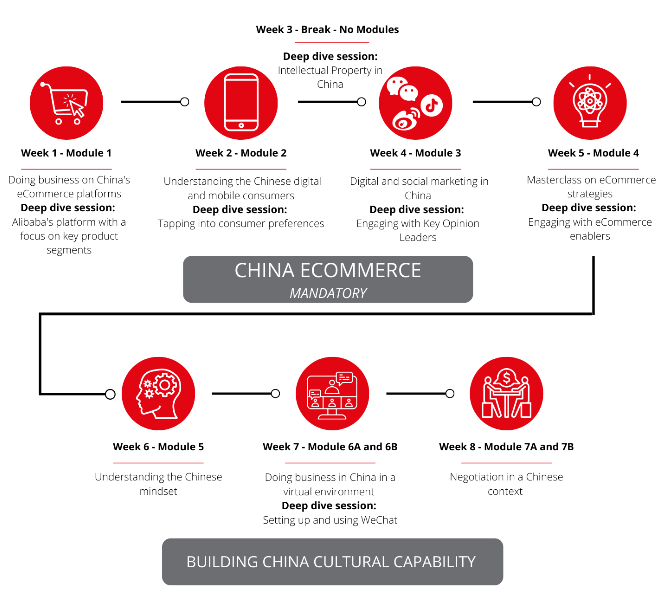
In less than 24 hours, Chinese online shoppers snapped up more than $1 billion worth of Australian goods.
The year was 2020 and the occasion was the world’s biggest shopping festival, known as “Singles Day”. And despite last year’s event being pared back, many Australian brands remain hugely popular with Chinese bargain hunters.
Little wonder so many Australian companies try to target the market.
But Carolyn Heath says success is far from guaranteed. The Sydney-based marketer has a long history of designing Chinese e-commerce strategies for international health and beauty brands, and says competition has never been tougher.
During lockdowns last year, Heath spotted a virtual program for Australian businesses engaged in the Chinese market. It’s known as the China Digital Economy Academy and run by Asialink Business, with support from the National Foundation for Australia-China Relations.
“When I told my boss that I wanted to do this course, she asked me, ‘Why? You already know all this stuff’. And I said you can never assume you know everything … you never know what’s going to lead to what,” says Heath.
She signed up, along with nearly 150 other businesses.
It was the right call.
As part of the program, Heath took part in a series of business matchmaking meetings set up by Austrade. That resulted in her hair care company securing a new China-based trade partner.
“Just a change in the TP [trade partner] made all the difference,” Heath says.
“You can have no success with one company, but if you find another one with the right fit and the right know-how and the right connections, you can do much better.”
‘A lot of experience in the room’
China’s e-commerce market has been the world’s largest since 2013 and last year contributed to more than half of global online retail sales.
At least 2,000 Australian businesses are known to be playing in the space.
“We saw COVID-19 effectively accelerate the digital marketplace shift, and there was no market moving as fast as China,” says Asialink Business’s Associate Director of Strategy and Capability, Shiraz Engineer. “So, we wanted to really build Australian business capability to succeed in that market.”
Engineer says the China Digital Economy Academy is “the first of its kind” to break down the landscape in detail. It consists of a series of modules, each with its own facilitator and guest speakers.
The depth of content was what drew Catherine Cervasio to the program. Her organic baby care business, Aromababy, has been working on the China market since 2006.
“You can’t just sit on what you know and think that nothing’s changed,” she says.

Cervasio describes the program as two months well spent.
“I know quite a lot from being at the coalface [of doing business in China],” she says. “So for me to still be able to get something really valuable out of this course, that’s enough for me to be happy to promote it and encourage other exporters to jump on board.”
She says that despite it being online, the program was a great space for like-minded Australian businesses to connect and share tips during breakout sessions.
Many of the participants were established exporters just like Cervasio.
“That’s what I loved about it,” she says. “There was a lot of experience in the room.”
She says the knowledge she gained has now enhanced her negotiations with a potential Chinese distributor.
Business becomes personal
The Academy has even proven popular with those who don’t sell directly into China.
“A lot of the people that I’m working with have Chinese heritage,” says international executive, Angeline Lopes who usually works with clients outside of greater China. “I think it’s very important to understand how to conduct yourself properly.”
The program’s cultural capability sessions tackle things such as building relationships in a virtual setting, and doing business in the context of Chinese values such as ‘guan xi’ (relationships) and ‘mian zi’ (one’s dignity or reputation).
Lopes says after learning that Chinese clients prefer to call their foreign partners by Chinese names, she recruited a colleague’s help to come up with one of her own.
“I’ve spoken to a few customers since then, and they’re like, ‘That’s a beautiful name!’,’’ she says.

According to Asialink Business’s Shiraz Engineer, cultural gestures can make a significant difference.
“We’ve got data that suggests 80 per cent of companies with an above average Asia capability generate 40 per cent of their revenues from Asian markets,” he says. “You’ve got to build trust with partners and once you build that trust, doing business becomes a lot easier.”
And the benefits extend beyond the bottom line.
“I think it’s not always just about business,” says Aromababy’s Catherine Cervasio. “It really is about building those long-term relationships for the benefit of both parties. I’ve made lifelong friends through doing business in China.”
Due to the success of the program and ongoing demand, a further course of the China Digital Economy Academy will be run from November 2022. Registrations are essential, monitor the Foundation’s Facebook page and the Asialink Business website for further updates.

